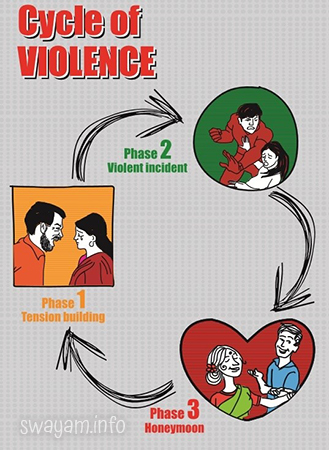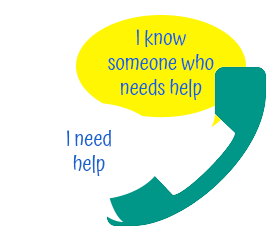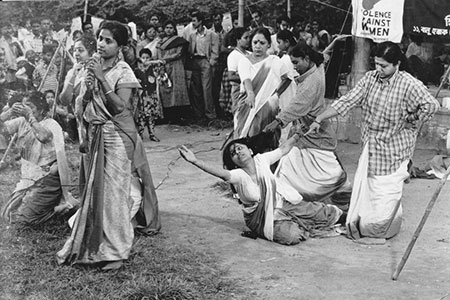Recognizing Abuse and the Cycle of Violence
Not sure if you or someone you know are experiencing abuse? Here is some information on recognising signs of abuse. Abuse can take on many forms including physical, emotional, sexual and financial abuse.
Forms of Abuse and Recognising the Signs
- Physical Abuse: The perpetrator uses physical force using their body or an object to injure you. This can include punching; slapping; hitting; biting; kicking; pulling hair out; pushing; shoving; burning; strangling; pinning you down; holding you by the neck or restraining you; setting fire to you or burning you and/or locking you outside of the house. Physical abuse does not need to leave a mark, bruise or scar. If you are suffering from any of these acts the violence may well get even worse over time.
- Emotional Abuse: Emotional abuse can be harder to recognize. If someone is repeatedly bullying you, controlling you, wearing down your self-esteem and/or affecting your mental health you are being emotionally abused. If you change your behavior because you are frightened of how this person(s) will react you may also be subject to abuse. Examples of emotional abuse are: being isolated from your family/friends, not being allowed to socialize, abusive language directed towards you, being humiliated or insulted, being threatened with violence – towards you or your children/family, being accused of affairs and/or dictating how you dress.
- Sexual Abuse: No one should force, coerce or manipulate you into having sex with them. Sexual abuse is not just forced penetrative sex; it can also take on many forms. Sexual abuse involves using force, threats or intimidation to make you perform any sexual act. It can also include being forced to have sexual relations with someone else, forced to watch pornographic images, having intimate pictures of yourself shared with others/on social media and/or being verbally abused about your sexuality.Remember that the law states that a woman’s consent must be unequivocally communicated for it to not constitute rape. If you are scared and do not physically resist sexual assault, this does not mean the perpetrator cannot be charged.
- Financial Abuse: Financial abuse may isolate you even further and make you feel powerless. It is exerting control over you in a financial way. The abuser(s) may take your money away from you, deprive you of money or not give you enough to live properly, they may stop you from working or take away your belongings/wedding gifts. If you or someone you know is facing any of these signs of abuse you can read more about Your Rights & The Law and/or see our Contact Swayam page.
Intimate Partner Violence and the Difficulty in Leaving: The Cycle of Violence

Interpersonal violence generally follows a pattern of abuse – this is the cycle of violence and it helps to explains why some women don’t leave abusive relationships. Abused women are often not constantly being ill-treated nor does the violence occur at completely random times. Abuse is inflicted in a repeating cycle that is made up of three phases – tension building, violent incident and honeymoon period:
Tension builds up in the relationship and results in an incidence of violence after which the abuser is very repentant, apologises, says he will not do it again and even buys her gifts or takes her out. This is the honeymoon period. After a while the tension starts building up again until a violent incident occurs, followed by another honeymoon phase. The time between the phases gets shorter over time. Breaking this cycle is difficult for women as they keep thinking that the violence is an aberration and that the abuser will change.
Why do women stay?
- Emotional attachment to the abuser
- The hope the perpetrator will change
- Belief that violence is her fate
- To maintain family honour
- For the sake of the children
- LACK of…
- Shelter
- Financial resources
- Family support
- Literacy, education, skills
- Awareness of her rights and alternatives
- FEAR of…
- Repercussions on family members
- Being ostracised from society
- Family support
- Revenge by the abuser
- Social stigma
- Religious and social beliefs that she must ‘adjust’ and that her responsibility is to preserve the family at all costs
 Interpersonal violence generally follows a pattern of abuse – this is the cycle of violence and it helps to explains why some women don’t leave abusive relationships. Abused women are often not constantly being ill-treated nor does the violence occur at completely random times. Abuse is inflicted in a repeating cycle that is made up of three phases – tension building, violent incident and honeymoon period:
Tension builds up in the relationship and results in an incidence of violence after which the abuser is very repentant, apologises, says he will not do it again and even buys her gifts or takes her out. This is the honeymoon period. After a while the tension starts building up again until a violent incident occurs, followed by another honeymoon phase. The time between the phases gets shorter over time. Breaking this cycle is difficult for women as they keep thinking that the violence is an aberration and that the abuser will change.
Interpersonal violence generally follows a pattern of abuse – this is the cycle of violence and it helps to explains why some women don’t leave abusive relationships. Abused women are often not constantly being ill-treated nor does the violence occur at completely random times. Abuse is inflicted in a repeating cycle that is made up of three phases – tension building, violent incident and honeymoon period:
Tension builds up in the relationship and results in an incidence of violence after which the abuser is very repentant, apologises, says he will not do it again and even buys her gifts or takes her out. This is the honeymoon period. After a while the tension starts building up again until a violent incident occurs, followed by another honeymoon phase. The time between the phases gets shorter over time. Breaking this cycle is difficult for women as they keep thinking that the violence is an aberration and that the abuser will change.




